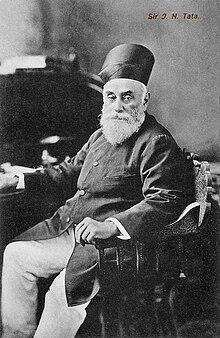
Back جامستجي تاتا Arabic جامستجى تاتا ARZ Jamsetji Tata AST Cəmşidci Tata Azerbaijani Джамшеджи Тата Bashkir Джамшетджи Тата Bulgarian জামসেদজি টাটা Bengali/Bangla Jamsetji Tata Catalan Džamšéddží Táta Czech Jamshedji Tata German
Jamsetji Tata | |
|---|---|
 | |
| Born | Jamshedji Nusserwanji Tata 3 March 1839 |
| Died | 19 May 1904 (aged 65) |
| Resting place | Woking, Surrey, England, United Kingdom |
| Alma mater | Elphinstone College |
| Occupation(s) | Industrialist, Philanthropist |
| Known for | Founder of Tata Group Founder of Tata Steel Founder of Jamshedpur |
| Spouse | Hirabai Daboo |
| Children | 2, including Dorabji and Ratanji |
| Relatives | Tata family |
Jamshedji Nusserwanji Tata (3 March 1839 – 19 May 1904) was a pioneering Indian industrialist who founded the Tata Group, India's biggest conglomerate company. Named the greatest philanthropist of the century by several polls and ranking lists, he established the city of Jamshedpur. He is regarded as the Father of Indian Industry.[1][2]
Born into a Zoroastrian Parsi family in Navsari, his family had fled persecution in Persia, finding refuge in India. Despite coming from a family of priests, Tata broke tradition to become the first businessman in his family, establishing an export trading firm in Mumbai. Tata's education was notable for its Western influence, which he received after showing exceptional abilities in mental arithmetic. He graduated from Elphinstone College in Mumbai as a "Green Scholar."
After working in his father's export-trading firm and recognizing opportunities in the cotton industry during a business trip to China, Tata founded a trading company in 1868. He later ventured into the textile industry, buying a bankrupt oil mill and converting it into a cotton mill. Tata's innovative strategies and commitment to industrial development in India led him to establish key institutions and companies, including the Taj Mahal Hotel in Mumbai, which was India's first hotel with electricity, and significant contributions towards the establishment of the Indian Institute of Science, Tata Steel, and Tata Power.[3] He was so influential in the world of industry that Jawaharlal Nehru referred to Tata as a One-Man Planning Commission.[4]
Tata was a philanthropist, particularly in the fields of education and healthcare. His donations and foundations laid the groundwork for modern Indian industry and philanthropy. Tata's legacy includes the city of Jamshedpur, named in his honor, and a lasting impact on India's industrial and social landscape. He married Hirabai Daboo, and their sons, Dorabji Tata and Ratanji Tata, continued his legacy within the Tata Group. Tata's contributions were recognized posthumously, including being ranked first in the "Hurun Philanthropists of the Century" (2021) by total donations of $102 billion (in 2021 prices) with the start of his key endowments back in 1892.[5][6][7]
- ^ "Tata Central Archives". www.tatacentralarchives.com. Archived from the original on 12 May 2021. Retrieved 12 May 2021.
- ^ "webindia123-Indian personalities-Industrialists-Jamshedji Tata". webindia123.com. Archived from the original on 10 April 2019. Retrieved 12 January 2008.
- ^ Benjamin, N. (2004). "Jamsetji Nusserwanji Tata: A Centenary Tribute". Economic and Political Weekly. 39 (35): 3873–3875. ISSN 0012-9976. JSTOR 4415463.
- ^ N, Benjamin (2004). "Jamsetji Nusserwanji Tata: A Centenary Tribune". Economic and Political Weekly. 39 (35): 3873–3875. JSTOR 4415463.
- ^ "Hurun Report – Info – 2021 EdelGive Hurun Philanthropists of the Century". www.hurun.net. Archived from the original on 5 July 2021. Retrieved 1 July 2021.
- ^ Wadhwa, Puneet (23 June 2021). "Jamsetji Tata tops global list of top 10 philanthropists from last 100 yrs". Business Standard India. Archived from the original on 6 July 2021. Retrieved 1 July 2021.
- ^ Chakraborty, Chiranjivi. "Not the Gates, Jamsetji Tata is philanthropist of the century with $102 bn in donations". The Economic Times. Archived from the original on 23 June 2021. Retrieved 1 July 2021.
© MMXXIII Rich X Search. We shall prevail. All rights reserved. Rich X Search